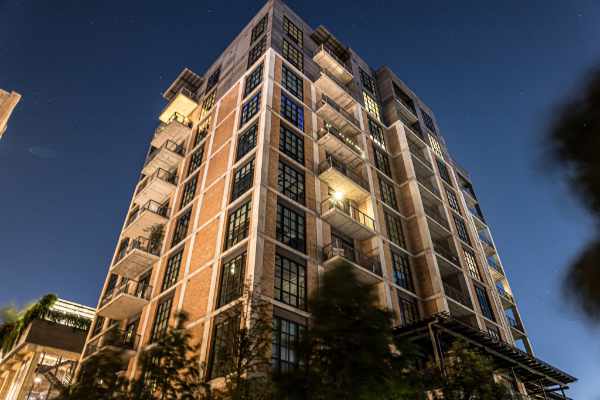Investing in a condo can be lucrative, offering the potential for rental income, long-term appreciation, and low-maintenance living. Nevertheless, before delving into the realm of real estate, it’s important to fully understand what you’ll be getting into. In this piece, we shall examine 14 critical things to know before buying a condo.

Things to Know Before Buying a Condo
Before we jump in, it’s always a smart idea to partner with a real estate expert in your area. Why? Because if they are reputable, they’ll want to help you succeed. Not just in this one real estate transaction, but going forward in life. This expert can share so much valuable information as you move forward, it’s in your best interest to tackle this task first.
Now, with a local expert on your team, let’s look at the particulars of buying a condo rather than a single-family home.
1. Location Matters
When conducting research on a specific area, several key aspects need to be thoroughly examined. Firstly, evaluating the neighborhood is essential to gain insights into its overall safety, community vibes, and general living conditions. This involves investigating crime rates, and the presence of schools, parks, and other essential services.
If you’re considering Canada, there are several major cities that have a lot to offer—Toronto, Vancouver, and Montreal—which are three of the main ones. Each city offers a unique lifestyle, enriched cultural scene, top-notch healthcare facilities, and excellent educational institutions, making it highly desirable for individuals and families seeking homes. If you’re interested in finding a loft for sale in Canada, you should check this page to explore available options.
Lastly, checking for development plans in the area is vital to anticipate potential changes that could affect property value and the overall living experience. This is especially important for long-term investments, ensuring the chosen area continues to thrive and appreciate value. By considering these factors, such as evaluating the neighborhood, exploring options in attractive Canadian cities, and checking for development plans, individuals can make informed decisions when researching an area for a loft purchase.
2. Financial Considerations
One of the first things to know before buying a condo deal with money. You’ll want to analyze the financials of each condo you are considering. Evaluate the ratio of debt to income, your credit score, and your overall financial security. Additionally, consider the down payment, monthly mortgage, property taxes, and other expenses. Make sure to have a clear understanding of your budget and the total cost of ownership.
3. Property Inspection
As in buying a single-family home, you’ll want to conduct a property inspection on the condo as well. Your inspector will be looking for any signs of damage, wear, or potential maintenance issues. Pay extra attention to the plumbing, electrical, and HVAC systems, as these are the most expensive to repair. Your professional home inspector should provide a comprehensive report for you to evaluate with your real estate agent.
4. Reviewing Rules and Regulations
Every condominium complex possesses a distinct set of rules and regulations that oversee the behavior of its residents. Review these documents carefully to ensure they align with your lifestyle and investment goals. Pay particular attention to rental policies, pet regulations, and restrictions on property modifications.
5. Evaluating the Condo Association
The efficiency of the condo association plays a vital role in the overall investment experience. Assess their financial health, reserve funds, and the frequency of meetings. A well-managed association will ensure timely maintenance and upgrades, ultimately safeguarding your investment.
6. Analyzing Market Trends
Stay updated on the local real estate market trends. Research the area’s historical property appreciation rates, rental demand, and vacancy rates. This information will enable you to arrive at a well-considered choice regarding the prospective gains on your investment.
7. Insurance Coverage and Liability
Protect your investment with adequate insurance coverage. Consider condo insurance that covers the interior of your unit, personal property, and liability. Additionally, verify the condo association’s master insurance policy to understand your shared responsibilities.
8. Talking to Current Residents
Speak with current residents to gain insights into the living experience within the complex. Their perspectives can reveal both positive and negative aspects, providing you with a realistic view of the community.
9. Rental Income and ROI Potential
If you’re considering the condo as a rental property, analyze the potential rental income and return on investment (ROI). Compare the rental rates in the area to determine if the acquisition aligns with your financial goals.
10. Tax Implications and Benefits
Understand the tax implications of owning a condo. Depending on your location and usage (rental vs. primary residence), you may be eligible for certain tax benefits. Consult with a tax professional to optimize your tax strategy.
Plan for various exit strategies from the beginning. A well-chosen condo in a desirable location can be sold or rented out quickly, but be prepared for changes in market conditions. Ensure your investment remains marketable in various scenarios.
11. Condo vs. Other Real Estate Investments
Make a comparison between condominium investments and alternative real estate opportunities, like single-family residences or multi-unit properties. Each investment category has its advantages and disadvantages, and selecting the most suitable option relies on your specific investment goals and level of risk acceptance.
12. Protecting Your Investment
Maintain and protect your condo investment by following best practices for property management. Respond promptly to tenant or association issues, and keep up with necessary repairs and upgrades to preserve the property’s value.
13. Exit Clauses and Contingencies
Your real estate agent will be able to provide guidance in this area. Look to see if your contract to purchase includes exit clauses and/or contingencies in the event that the home inspection or financing uncovers problems. These provisions allow you to back out of the deal under specific circumstances, safeguarding you from unforeseen complications.
14. Condo Flipping Considerations
If your plan involves flipping the condo, thoroughly research the local real estate market and renovation costs. Factor in potential holding costs and market demand to ensure a successful flip.
Conclusion: Making an Informed Decision
Investing in a condo can be a rewarding venture when approached with careful consideration and preparation. Hopefully, now that you have read the things to know before buying a condo you have a more thorough understanding of what’s involved. There are details that can be extremely important when it comes to investing in condominiums.
Make sure to take advantage of your real estate agent. Ask a lot of questions. Always bear in mind that exercising patience and conducting thorough investigations are pivotal in optimizing your gains and safeguarding your investment for the future.


